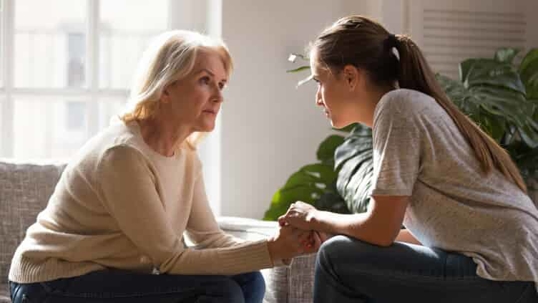If you know someone who is a victim of domestic violence, it is essential to stay connected with that person. Whether the individual is a friend, family member, or colleague, your support could be the difference between staying in an abusive situation or getting help. For most people, it is hard to know how to truly help a person in such a situation. These are some steps you can take.
Start Talking
Talk to the person. Your conversations do not all have to be about domestic violence. In some cases, people who are victims prefer not to talk about their situation every day. Take a genuine interest in the person's wellbeing. Ask how the person's day was, and ask about other interests. If you see bruises or signs of domestic abuse, express your concern for the individual. It may take a while for someone who is a victim to open up to you. Keep in mind that many domestic violence victims are afraid to tell people about their problems for fear of the abuser finding out. Let the person know that you are a safe friend, family member, or colleague.
Make Time for Listening
Once someone who is a victim trusts you and needs to talk, be sure to listen. Not all people will reach out a second time. It takes a great deal of courage to share personal thoughts, experiences, and fears in many cases. Try to actively listen. If the individual wants to meet to talk, be sure to allow yourself plenty of time. As you listen, be sure to avoid sounding judgmental about the victim or the abuser. It can be easy when someone is talking badly about a partner to join in with the insults, but it is better to listen objectively. It is ok to ask questions for clarification, but any talking session should primarily be about letting the victim vent. Be sure to also validate the victim's feelings by letting the person know that any feelings are ok to feel. However, let the person know that the abuser's actions are not ok.
Believe the Victim
Some of the actions of abusers are so terrible that they may sound unbelievable to someone who has not experienced domestic violence. When a victim recounts an experience, do not question it. Even if there is doubt about all the details being true, it is important to believe the victim and make sure that the person knows this. If a victim feels like people do not believe what is happening, they may stop talking about it. Victims who do not have someone to talk to may hurt themselves or continue being hurt for a long time by their abusers. Let the victim know that the abuse is not his or her fault. Victims need to be told that they deserve better and that they are important.
Know the Emotional Signs of Domestic Violence
These are some emotional and behavioral signs that some victims show:
- Apologizes often for anything, even if it is unnecessary.
- Has low self-esteem.
- Acts anxious or fearful.
- Talks about sleep problems.
- Has a substance use problem.
- Talks about suicide.
- Becomes withdrawn from social activities or responsibilities.
- Is often late to work or cancels plans.
- Is obsessive and extreme about privacy.
Know the Physical Signs of Domestic Violence
An occasional injury may be normal for any person, but people who have frequent injuries may be domestic violence victims. These are some possible signs of domestic violence that you may see by observing a person:
- Bruises or abrasions around the wrists or arms.
- Broken or fractured bones.
- Purple or red marks on the neck or shoulders.
- Blackened eyes or broken lip skin with a bruise.
Offer Help or Resources
You can offer to help the victim by providing resources or offering to call for help when needed. Although it is not a good idea to get involved directly for your own safety and the victim's safety, you can help the person create a safety plan. Talk to a local domestic violence organization to learn the right steps to create a safety plan for the person's situation. Some victims are afraid to leave because they fear the abuser, believe the partner will change, financial worries, or other reasons.
Also, some people stay with an abuser because they are married or have children together. It is important to speak with an attorney who understands the complexities of domestic violence situations and family law when this happens.
At the Law Offices of Christopher L. Hoglin, P.C., we are sensitive to the needs of domestic violence victims. Consultations with us are completely confidential. Call us today at (626) 653-4075 to learn more about how we can help domestic violence victims with legal matters.

